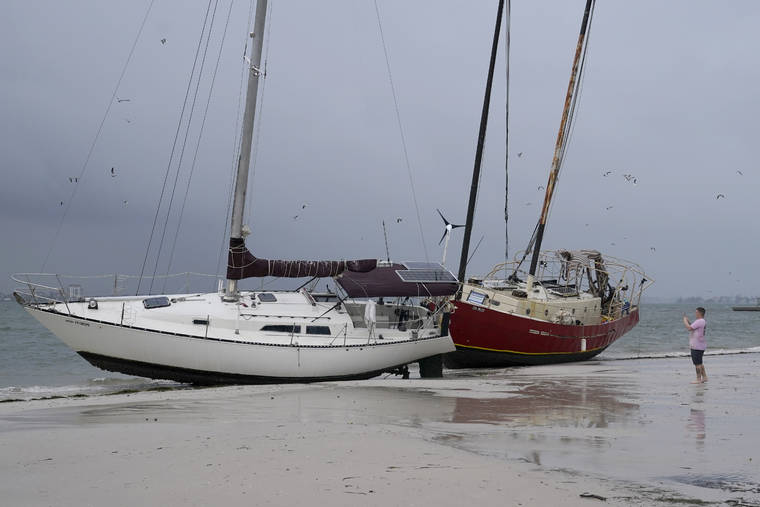ST. PETERSBURG, Fla. — Tropical Storm Eta dumped blustery rain across north Florida after landfall Thursday morning north of the heavily populated Tampa Bay area, and then sped out into the Atlantic off of the neighboring coasts of Georgia and the Carolinas.
Some flooding was reported, but no major damage though one death in Florida was linked to the storm.
Some parts of the Carolinas saw three to seven inches of rainfall by Thursday afternoon due to a combination of moisture carried by the cold front that pushed Eta across Florida and moisture from the Gulf of Mexico brought in by the tropical system.
That’s led to flash flooding, multiple water rescues and road closures, and at least one collapsed bridge, said Sandy LaCourte, a meteorologist with the National Weather Service in Greenville, South Carolina.
“It’s unfortunately been a tough day for the Carolinas today,” LaCourte said.
Earlier, Eta slogged ashore near Cedar Key, Florida, before moving northeast across the state, according to the National Weather Service in Miami. The storm emerged into Atlantic waters early Thursday afternoon and was forecast to pass just offshore of South Carolina and North Carolina as it races up the Southeast seaboard through Friday morning.
At 4 p.m., the storm was centered about 90 miles (150 kilometers) south-southwest of Charleston, South Carolina. It had top sustained winds of 40 mph (65 kph) and was moving to the northeast at 18 mph (30 kph).
Although it was not the most powerful storm to hit the U.S. this year, Eta still had broad impact across the Tampa Bay region, which is home to more than 3.5 million people across five coastal counties. No mandatory evacuations were ordered, but authorities opened shelters for anyone needing them. Local media reported only a handful of people showed up.
In Bradenton Beach, Florida, Mark Mixon stepped into his flooded garage as he was laying sandbags around his home on Wednesday evening and was electrocuted, said Jacob Saur, director of public safety for Manatee County. There were appliances plugged into the garage and Mixon was killed when he stepped into the water, Saur said.
Rescue crews had to wait for Florida Power and Light, which was responding to power outages from the storm, to shut down the electrical grid for the neighborhood where Mixon lived before they could assist, Saur said.
The storm did force closure of some lanes of Tampa Bay bridges because of storm surge but they were reopening Thursday. Also reopening was the Sunshine Skyway Bridge, which links Pinellas and Manatee counties.
Earlier, firefighters in Tampa rescued around a dozen people who got stuck in storm surge flooding on Bayshore Boulevard adjacent to the bay. Some vehicles remained on the roadway Thursday. Isolated neighborhoods also experienced enough flooding to evacuate.
J.P. Brewer, owner of Salty’s Gulfport, was cleaning up after her beachside restaurant flooded Thursday morning.
“It was pretty bad last night when I came in,” she said, adding that there were already 3 to 4 inches (8 to 10 centimeters) of water inside by just before high tide. “We’re in here doing our cleanup today and assessing the damage. I think we fared pretty well considering as bad as it looked last night.”
Several sailboats broke free from their moorings and washed ashore in Gulfport, including the vessel where Mo Taggart has lived for two years with her dog. She thinks the boat is a total loss.
“I mean, it was disaster,” Taggart said. “I mean, I came out here. My boat’s just up against the seawall, just smashing, smashing … I need to get another boat. I want to be back on the water, (my dog) wants to be back on the water.”
President Donald Trump approved a federal emergency declaration for 13 counties along or near the Gulf coast, adding them to South Florida counties the storm struck previously.
The storm had meandered in the Gulf of Mexico earlier this week after crossing over South Florida on Sunday.
Eta first hit Nicaragua as a Category 4 hurricane and killed at least 120 people in Central America and Mexico, with scores more missing. It then moved into the Gulf of Mexico early Monday near where the Everglades meet the sea.
Eta then crossed over the Florida Keys island chain at Lower Matecumbe Key, but the densely populated areas of Miami-Dade and Broward counties to the northeast bore the brunt with heavy rainfall and flooding.
It was the 28th named storm of a busy Atlantic hurricane season, tying the 2005 record for named storms. A 29th named system, Tropical Storm Theta, was centered Thursday about 455 miles (730 kilometers) south-southwest of the Azores and moving east.
This extraordinarily busy season has focused attention on climate change, which scientists say is causing wetter, stronger and more destructive storms.
———
Frisaro reported from Fort Lauderdale, Florida. Associated Press photographer Lynne Sladky and video reporter Cody Jackson contributed to this report from Pinellas County and AP reporter Michelle Liu contributed from Columbia, S.C.


